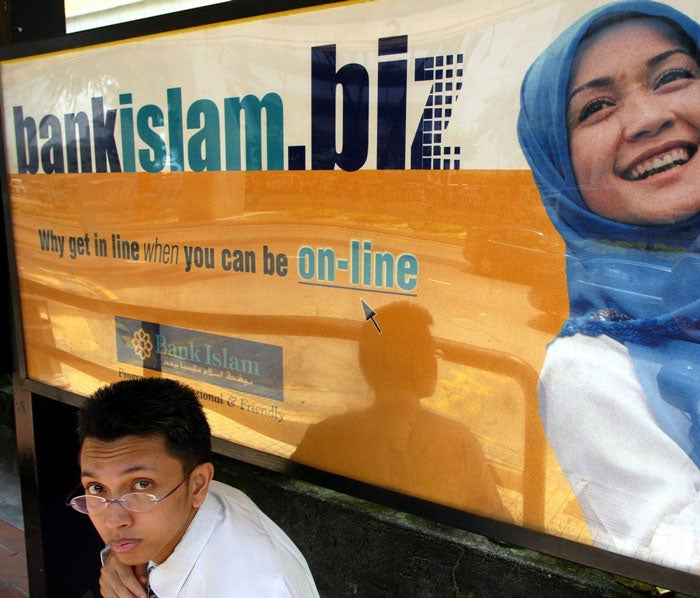As Islamic banking takes off, new courses are being set up in the universities

Your support helps us to tell the story
From reproductive rights to climate change to Big Tech, The Independent is on the ground when the story is developing. Whether it's investigating the financials of Elon Musk's pro-Trump PAC or producing our latest documentary, 'The A Word', which shines a light on the American women fighting for reproductive rights, we know how important it is to parse out the facts from the messaging.
At such a critical moment in US history, we need reporters on the ground. Your donation allows us to keep sending journalists to speak to both sides of the story.
The Independent is trusted by Americans across the entire political spectrum. And unlike many other quality news outlets, we choose not to lock Americans out of our reporting and analysis with paywalls. We believe quality journalism should be available to everyone, paid for by those who can afford it.
Your support makes all the difference.It's the fastest-growing sector of the banking industry, yet few City boys know much about it and hardly any finance students are being taught it. But Islamic banking's mysteries are now beginning to be unveiled and recently a business school and an accountancy body have announced new postgraduate programmes specialising in it.
There are more than 250 Islamic banks worldwide, with at least £300bn in assets, up from £5bn in 1985. Small fry in the global economy, but growing at an astonishing 15 to 20 per cent a year. Rising oil prices and Europe's growing Muslim population are driving an extraordinary surge in financial products compliant with Islamic law, eschewing interest and respecting Islamic ethical norms in investment.
Just a few years ago, Islamic banks stood accused of funding terrorism. Now Gordon Brown has promoted London as a hub for Islamic finance, three British Islamic banks have been set up, and big players such as HSBC and Lloyds TSB have started offering Islamic financial products and services. To train bankers to develop these products, Bangor University's business school is starting up a fully fledged Islamic banking Masters this September, the only university so far to offer one.
Islamic banking is, on the surface, something of a paradox. Islam forbids usury, the accumulation of interest, the cornerstone of the banking system. And holy law also prohibits Muslims from profiting from taboo industries, such as alcohol, gambling, and pornography.
At the same time, Islamic banks must offer competitive rates of interest and turn a profit. At present, banks take several approaches, taking a fee for matchmaking investors and borrowers, buying into the venture themselves, or buying and leasing assets to potential borrowers.
Teaching the complexities of the markets and the Byzantine mass of Islamic scripture is impossible in a year, so Bangor's course will balance finance and Islam, with the emphasis on the first. "You have people who take the religious approach, where a lot of the debate is about the semantics," says Phil Molyneux, professor of banking and finance and head of Bangor Business School. "We won't be spending a lot of time on that."
The new course has already attracted applications and interest from the Muslim world and even from non-Islamic financial hubs such as Hong Kong. Still, it is a fairly daring move. Most students are expected to come from overseas and the university faces stiff, and cheaper, competition from courses elsewhere, in particular the International Islamic University Malaysia.
Two specialist Islamic Masters programmes running in the UK a few years ago, at the University of Durham and Loughborough University, were cancelled. Durham still offers a summer school and is the world's largest research hub for Islamic finance, with 25 PhDs at work at the university, but Rodney Wilson, professor of economics at Durham, says there was simply not enough demand from the right students.
Islamic finance is, inescapably, a complex business. There are thousands of pages of fiqh, the Islamic jurisprudence that has emerged around interpreting the Koran and sharia. It is not simply a matter of sneakily dodging interest payments. "Structures ought to be quite different," says Professor Wilson. By law, they have to be to qualify as Islamic. That does not mean that Islamic finance is just for Muslims. Many students from other faiths and none are attracted by the chance to build a more ethical banking model, he says.
If Islamic finance's complexity is hard to fit into a year, how about into a module? This year, Lancaster University Business School joined Cass Business School and SOAS's Centre for Financial and Management Studies in offering an optional module in Islamic finance as part of its postgraduate training.
Is one module enough? "We are not saying that a course is enough, but a Masters is too much," says Dr Marwan Izzeldin, course tutor at Lancaster. "A Masters will limit their chances. There are still more jobs in traditional banking than in Islamic banks." The course will be sufficient, he says, for graduates to work in the sector, analysing Islamic financial products.
A course geared to mature students who have a strong background in finance also starts this year. The Chartered Institute of Management Accountants' (CIMA) certificate in Islamic finance has been developed with a prestigious advisory group of sharia experts, so should be fairly comprehensive, but takes just two to six months of distance learning to complete.
"The certificate will assist employers in the City and other major financial centres throughout the world in equipping their employees to develop financial products," says Robert Jelly, director of education at CIMA. In the Islamic banks, the final nod, however, will still go to the sharia scholars on their boards.
Join our commenting forum
Join thought-provoking conversations, follow other Independent readers and see their replies
Comments